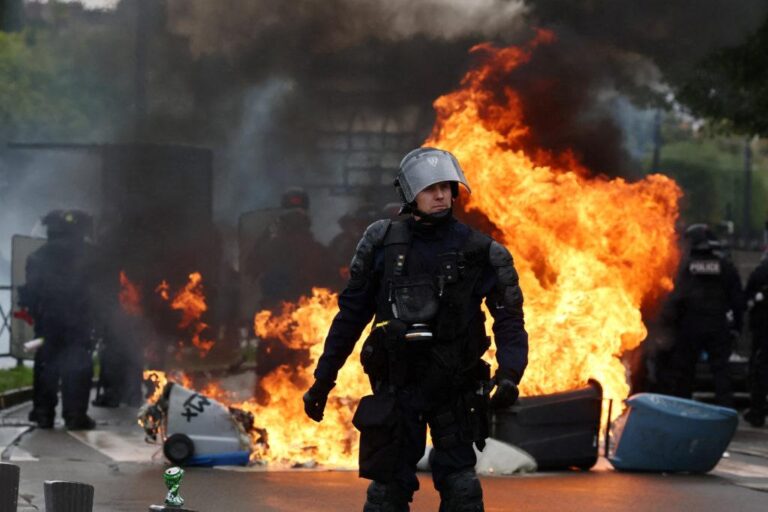Nationwide Protests in France Turn New Prime Minister’s First Day into Chaos
On a day marked by significant political transitions, France’s new Prime Minister faced an immediate storm of dissent as nationwide protests erupted in cities across the country. The demonstrations, ignited by public discontent over economic policies and social issues, transformed the new leader’s inaugural day into a scene of chaos. From Paris to provincial towns, thousands took to the streets, waving banners and releasing their frustrations over the government’s direction. As security forces struggled to maintain order, the tumultuous response raised questions about the challenges ahead for the newly appointed Prime Minister and the broader implications for the French government amid a climate of unrest.
Nationwide Unrest: The Impact of Protests on France’s Political Landscape
As protests erupted across France in response to a series of contentious government policies, the political landscape witnessed an unprecedented shift. Demonstrators displayed a wide variety of grievances, spanning economic inequality, labor rights, and climate concerns. This widespread discontent can be attributed to a growing perception that the government’s actions have failed to address the needs of everyday citizens. A confluence of factors has sparked this current unrest, including:
- Rising living costs
- Increased taxation on the middle class
- Dismissal of key social programs
- Environmental policies perceived as inadequate
The newly appointed prime minister faced a unique and daunting challenge on her first day as protests cascaded through cities like Paris, Lyon, and Marseille. With thousands of demonstrators clashing with police, the government’s credibility is at stake. Furthermore, parliamentary support has become increasingly fragile, leading to speculation about potential shifts in alliances. The unrest has prompted questions about:
| Political Implications | Potential Outcomes |
|---|---|
| Loss of public trust | Increased calls for reforms |
| Heightened political polarization | Challenges for coalition stability |
| Pressure on legislative initiatives | Calls for snap elections |
Public Sentiment: Understanding the Roots of Dissent Against Government Policies
The recent upheaval in France, marked by widespread protests on the very first day of the new prime minister’s tenure, underscores a deeper, simmering discontent among the populace. The demonstrations, fueled by frustrations over soaring living costs and perceived governmental neglect, have drawn significant attention to the underlying issues that perpetuate this dissent. As citizens took to the streets in droves, carrying banners and chanting slogans, their demands reflected a collective yearning for change and accountability in policy-making. Key factors contributing to this public outcry include:
- Economic Inequality: A growing divide between the affluent and the marginalized has intensified calls for reform.
- Austerity Measures: Cuts to essential services have left many feeling disenfranchised and ignored.
- Lack of Representation: Voters express concern that their voices are often overlooked in political decision-making.
This unrest is not merely a reaction to a single policy but reflects long-standing grievances that have festered over time. Citizens have expressed a desire for transparent dialogue with their leadership, seeking solutions that address their immediate needs and concerns. Moreover, historical context plays a significant role; France’s legacy of activism and resistance against perceived injustice continues to shape its political landscape. As unemployment rates rise and inflation erodes purchasing power, the stakes become higher, compelling more people to demand change through organized protests rather than traditional channels. A closer examination of recent protest data reveals a distinct pattern in public sentiment:
| Year | Protest Incidents | Major Issues |
|---|---|---|
| 2020 | 150 | Social Justice, Police Reform |
| 2021 | 120 | Health Crisis, Economic Recovery |
| 2022 | 200 | Cost of Living, Political Representation |
First Day of Turmoil: Challenges Faced by the New Prime Minister
The new prime minister faced significant hurdles on the inaugural day of their administration, as widespread protests erupted across the nation. Demonstrators voiced their dissent against proposed reforms in labor laws and pensions, echoing long-standing grievances against the government. Key challenges included:
- Public Outcry: A surge in spontaneous protests transformed city streets into battlegrounds for differing ideologies.
- Violence and Disorder: Clashes between protestors and law enforcement marred the atmosphere, leading to multiple injuries and arrests.
- Political Opposition: The prime minister faced a chorus of criticism from rival parties, which amplified calls for resignation and greater accountability.
In response, the government was forced to convene emergency sessions to address the unrest. Efforts to quell the chaos included:
| Action Taken | Description |
|---|---|
| Increased Security Measures | Deployment of additional police forces in key urban areas to maintain order. |
| Dialogue Initiatives | Engagement with community leaders to foster communication between the government and protestors. |
| Policy Review | Commitment to reassess proposed reforms in light of public concerns. |
Path Forward: Recommendations for Easing Tensions and Addressing Grievances
To effectively address the underlying issues driving the unrest in France, it is imperative for the government to engage directly with community leaders and representatives of key demographic groups. Establishing a series of community dialogue sessions could foster meaningful discussions, allowing the government to grasp the grievances more intimately. This initiative should focus on:
- Open Forums: Encourage citizens to voice their concerns in a structured environment.
- Transparency Measures: Regular updates on government decisions and policies affecting daily life.
- Grievance Redressal Mechanism: An accessible process for citizens to report and resolve issues with local authorities.
In addition to dialogue, policy reforms targeting economic disparity and social injustice must be prioritized. Legislative actions should include provisions for increased social services, dismantling systemic barriers to employment, and enhancing educational opportunities in marginalized communities. A strategic plan might encompass:
| Policy Area | Proposed Action |
|---|---|
| Employment | Create job training programs in collaboration with local businesses. |
| Education | Increase funding for schools in underserved areas. |
| Social Services | Expand access to mental health and community support services. |
Final Thoughts
As protests erupted across France on the first day of Prime Minister Élisabeth Borne’s tenure, the demonstrations reflected deep-seated discontent among citizens over economic challenges and government policies. The nationwide unrest, characterized by clashes between protesters and police, marks a tumultuous beginning for Borne, who has vowed to advance reforms amid escalating tensions. With citizens demanding change and a government grappling with backlash, the coming weeks will be pivotal in determining the trajectory of the new administration and its ability to address the pressing issues facing the nation. As France navigates this period of social upheaval, the implications of these protests will resonate well beyond the streets, affecting the political landscape and public sentiment in the months ahead.




